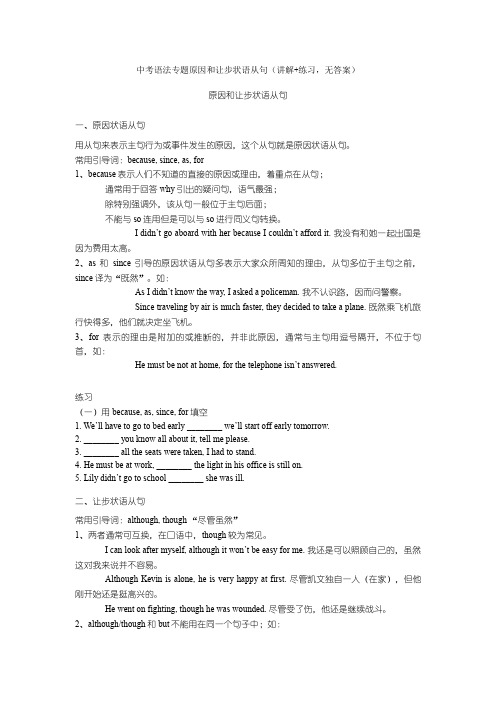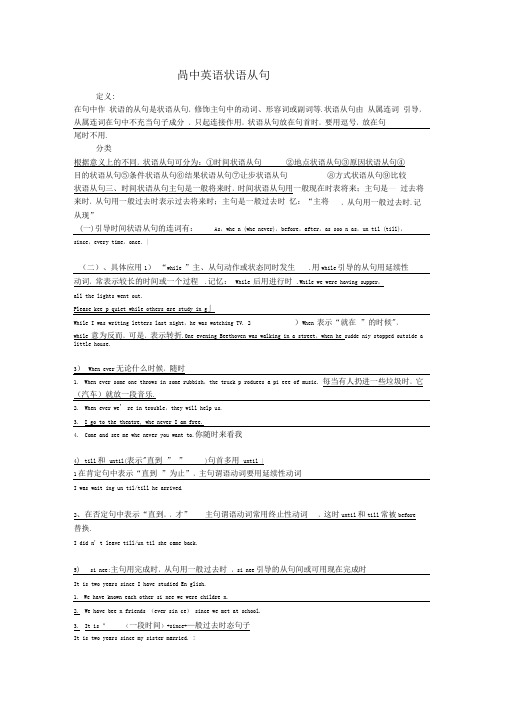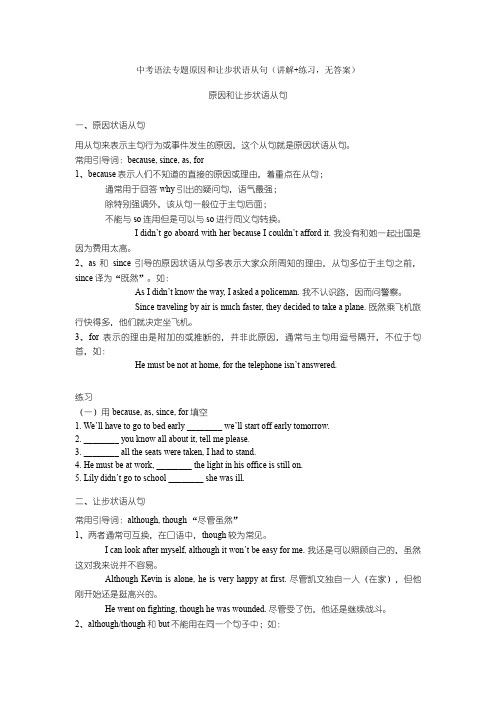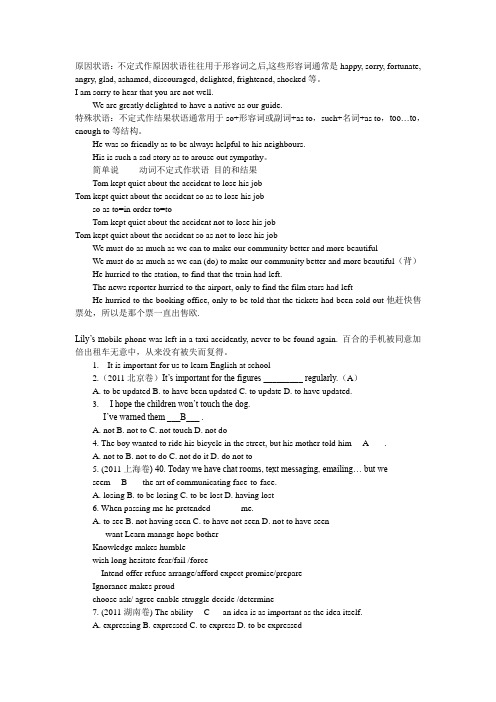状语的具体讲解(四)原因状语
- 格式:docx
- 大小:13.52 KB
- 文档页数:6

状语从句的讲解就是用一句话作状语分为:时间,地点,方式,原因,结果,条件,让步,目的,比较一、时间状语从句第一次见到你一见到你我就喜欢上了你直到见到你五岁时见到你When, as, while, before, after, since, till/until, as soon as no sooner…than…scarcely…when…hardly…when… the minute the second the instant the moment by the time 截止 immediately instantly directlyeach time every time next time the first time on doing sthwhenwhile 当…时as1。
when 1)当…时/ 延续性动词短暂性动词都可用2)这时/3)届时、到时I was watching TV when my cellphone suddenly rang这时When I was five years old I could speak five languagesThe wet weather will continue tommorow when a cold front is expected to arrive届时到时注意:时间状语从句中动作发生有前后时先发生的用过去完成时When my mother came back I had already gone to bed.2。
while 1)从句动词延续性2)同时发生3)对比的意味“然而”4)趁着He taught himself while he worked in a bank 延续性动词当他在银行上班时While we were working they were having a rest.对比While they were having a discussion , they got very confused。

状语知识点归纳总结一、常见的状语种类1. 时间状语时间状语用来表示动作发生的时间,它通常由副词或者介词短语构成。
如:昨天、明天、以前、以后、上午、下午、晚上等。
2. 地点状语地点状语用来表示动作发生的地点,它通常由副词或者介词短语构成。
如:在家里、在学校、在街上、在山上等。
3. 方式状语方式状语用来表示动作发生的方式,它通常由副词或者介词短语构成。
如:快乐地、慢慢地、轻轻地、用力地等。
4. 原因状语原因状语用来表示动作发生的原因,它通常由副词或者介词短语构成。
如:因为、由于、由……引起等。
5. 目的状语目的状语用来表示动作的目的,它通常由副词或者介词短语构成。
如:为了、为了……而做等。
6. 条件状语条件状语用来表示动作发生的条件,它通常由副词或者介词短语构成。
如:如果、只要、除非、假如等。
二、状语的位置1. 句首状语状语通常放在主语之前,修饰整个句子。
如:昨天,我去了公园。
2. 句中状语状语通常放在句子的中间,紧跟在所修饰的成分之后。
如:我昨天去了公园。
3. 句末状语状语通常放在句子的末尾,修饰整个句子。
如:我去了公园昨天。
三、状语和句子成分的关系1. 状语和谓语的关系状语通常是修饰谓语,用来表示动作的时间、地点、方式等。
如:他快乐地唱歌。
2. 状语和宾语的关系状语也可以出现在宾语的前面或者后面,用来表示宾语的时间、地点、方式等。
如:我在家里看电视。
3. 状语和主语的关系状语也可以出现在主语的前面或者后面,用来表示主语的时间、地点、方式等。
如:昨天我去了公园。
四、状语的使用注意事项1. 修饰成分一致状语应该和它修饰的成分保持一致,如时间状语修饰时间,地点状语修饰地点。
2. 位置灵活状语在句子中的位置比较灵活,可以根据需要放在句首、句中或者句末。
3. 语序变化当主句使用了陈述语序时,时间、地点状语常放句首;当使用倒装语序时,时间状语常放句末。
4. 注意状语与其他成分的搭配要注意状语与其他成分的搭配,使得句子表达更加准确、自然。

中考语法专题原因和让步状语从句(讲解+练习,无答案)原因和让步状语从句一、原因状语从句用从句来表示主句行为或事件发生的原因,这个从句就是原因状语从句。
常用引导词:because, since, as, for1、because表示人们不知道的直接的原因或理由,着重点在从句;通常用于回答why引出的疑问句,语气最强;除特别强调外,该从句一般位于主句后面;不能与so连用但是可以与so进行同义句转换。
I didn’t go aboard with her because I couldn’t afford it.我没有和她一起出国是因为费用太高。
2、as和since引导的原因状语从句多表示大家众所周知的理由,从句多位于主句之前,since译为“既然”。
如:As I didn’t know the way, I asked a policeman. 我不认识路,因而问警察。
Since traveling by air is much faster, they decided to take a plane. 既然乘飞机旅行快得多,他们就决定坐飞机。
3、for表示的理由是附加的或推断的,并非此原因,通常与主句用逗号隔开,不位于句首,如:He must be not at home, for the telephone isn’t answered.练习(一)用because, as, since, for填空1. We’ll have to go to bed early ________ we’ll start off early tomorrow.2. ________ you know all about it, tell me please.3. ________ all the seats were taken, I had to stand.4. He must be at work, ________ the light in his office is still on.5. Lily didn’t go to school ________ she was ill.二、让步状语从句常用引导词:although, though “尽管虽然”1、两者通常可互换,在口语中,though较为常见。

咼中英语状语从句定义:在句中作状语的从句是状语从句,修饰主句中的动词、形容词或副词等.状语从句由从属连词引导,从属连词在句中不充当句子成分,只起连接作用,状语从句放在句首时,要用逗号,放在句尾时不用.分类根据意义上的不同,状语从句可分为:①时间状语从句②地点状语从句③原因状语从句④目的状语从句⑤条件状语从句⑥结果状语从句⑦让步状语从句⑧方式状语从句⑨比较状语从句三、时间状语从句主句是一般将来时,时间状语从句用一般现在时表将来;主句是—过去将来时,从句用一般过去时表示过去将来时;主句是一般过去时忆:“主将,从句用一般过去时.记从现”(一)引导时间状语从句的连词有:As,whe n (whe never),before,after,as soo n as,un til (till),since,every time,once. |(二)、具体应用1)“while ”主、从句动作或状态同时发生.用while引导的从句用延续性动词,常表示较长的时间或一个过程.记忆:While 后用进行时.While we were having supper,all the lights went out.Please kee p quiet while others are study in g」While I was writing letters last night,he was watching TV. 2 )When 表示“就在”的时候",while 意为反而,可是,表示转折.One evening Beethoven was walking in a street,when he sudde niy stopped outside a little house.3)When ever无论什么时候,随时1.When ever some one throws in some rubbish,the truck p roduees a pi eee of music. 每当有人扔进一些垃圾时,它(汽车)就放一段音乐2.When ever we' re in trouble,they will help us.3.I go to the theatre, whe never I am free.e and see me whe never you want to.你随时来看我4) till和until(表示"直到” ”)句首多用until |1在肯定句中表示“直到”为止”,主句谓语动词要用延续性动词I was wait ing un til/till he arrived.2、在否定句中表示“直到,,才”主句谓语动词常用终止性动词,这时until和till常被before 替换.I did n' t leave till/un til she came back.5) si nee:主句用完成时,从句用一般过去时,si nee引导的从句间或可用现在完成时It is two years since I have studied En glish.1.We have known each other si nee we were childre n.2.We have bee n friends (ever sin ce) since we met at school.3.It is ”(一段时间)+since+—般过去时态句子It is two years since my sister married. I(一段时间)have/has passed since +—般过去时态句子 Two sisters have/has p assed since my sister married.Si nce+时间点 1.1 have bee n at home since three o' clock this after noon.2. Maria has bee n in Chi na si nee two years ago. | 6) Every time, each time, next time Every time you get back at ni ght, you drop your boots on the floor. Every time I catch cold, I have pain in my back.Next time I go there, I will visit them. | 7) once —旦,就 Once you begin, you must go on. 你一开了头,就应该继续下去 .四、地点状语从句地点状语从句用 where, wherever 引导We should go where the people n eed us.我们应该去人民需要我们的地方 Where there is a will, there is a way. 有志者,事竟成.Wherever they went, they received a worm welcome. 无论他们走到哪儿都受到热烈欢迎 .1 She follow him whose he goes.他无论到哪里她总跟着五、原因状语从句原因状语从句用 because (因为),since (既然),as (由于)引导1、字母由多到少,语气由强到弱.2、由 why 提问必须用 because 回答Since, as 不回答why 的提问,而且从句一般放在句首‘because —般放在主句之后.3、 before of + 名词Because of the rain, we did n' t go to the park.because 禾口 so 不可连用,只能选其一.(另有 although, but ) Why did n' t he come to school? Because he was ill.Si nee I must die, I must. 既然我一定要死,我一定这样做 .Si nee a lot of people make mistakes in life, Mr Smith wan ted to give Joh n a Chance.5、for 并列连词,不能放在句首,主要放在两个并列句之间.For 所提供的理由为一个补充说明而且前面常有逗号隔开The days we short, for it is December now. 目的状语从句用 so (常用于口语),that, so that, in order that 引导目的状语从句的谓语常含有 may, might, can, could, should, would 等情态动词.1. We'll sit n ever to the front so we can hear well.2. He studied hard so that he might succeed.3.门I sp eak slowly so that you can take no tes. |4. They hurried to the stati on in order that they could catch the train.4、 八、目的状语从句5.1 took a taxi so that I could get there earlier. |6. I' m going to the lecture early so that I may get a good seat.七、条件状语从句条件状语从句由if, uni ess, (so) as long as(只需)弓丨导在条件状语从句中要用一般时表示将来时(与时间状语从句相同)We will miss the train if you don' t hurry.He said we would miss the train if we did n't hurry.You will fail the exam uni ess you study hard.=(if you don ' t study hard)He won ‘ t come uni ess he is in vited.=(if he isn't in vited) |Eat less food uni ess you want to become fatter.=(if you don ‘ t want to become better)As long as you are not afraid of difficulties, you are sure to succeed.As long as you don't lose heart, you will succeed.八、结果状语从句结果状语从句由such, that, so, .that, so that, that 引导1.Such, that的常用句型such +a/an +形容词+可数名词单数+that such +形容词+可数名词单数+that+thatSuch+形容词+可数名词复数(不可数名词)注意so many (much, few, little) + 名词,such a lot of (或lots of)+ 名词是惯用法,不可乱用. She is such a beautiful girl that we all like her. |They were such beautiful flower that we bought home.It was such delicious food that they ate it up.2. so+形容词或副词+thatso+形容词+a/an+可数名词单数+thatHe is so rich that he can buy lot of things for himself.He works so hard that he did everyth ing well.It was so hot a day that we all went swim ming.It was such a good day that we all went swim ming.3.S0 that, that都可以引导结果状语从句He did n't study hard, (so) that he failed the exam.4.Too, to, enough, to可以引导结果状语从句与so, that替换,so, that结构可以用too, to替换必须具备两个条件,一是主句和结果状语从句的主语必须一致,二是从句中的谓语部分必须含有can (could) not.She is young that she can’ t go to school.She is too young to go to schoo~|She isn't old eno ugh to go to school.九、让步状语从句although, thougheven though = even if, whether, or however = no matter how whatever = no matter what whoever = no matter who | whe never = no matter whe n wherever = no matter where *although禾口though者E表示"虽然”只是although 更正式,多用于句首,而though 用于句中,二者都可与yet, still连用,但不与but连用Although/Though they are poor, they ofte n help others.They are poor, but they often help others.Although he has failed many times, he does n' t give up trying.Whatever/No matter what you say, I won' t believe you.No matter what you say, I don' t care.No matter who you are, you must obey the rules of our school.However hard he tried, he failed aga in.No matter what the weather is like, you can always find surfers out ridi ng the waves.十、方式状语从句方式状语从句由as如同,按照),as if (though)引导*as和like都有“像”的意思,as是连词,后面连接句子,like是介词后面可加名词、代词或名词性短语.I did the work as others did. 相当于I did like others.You must do as I do.as if(though)两者意义相同,从句谓语动词常用虚拟语气,但实现可能性较大,则用连接词.It seems as if/though it' s going to rain.They are talki ng as if/though they were old frien ds.She treats me as if I were her brother.Whe n you are in home,do as the Roma ns do.Now that everybody has come, let ‘ s begin our conference.The higher in come tax is harmful in that it may discourage people from tryi ng to earn more. Con sideri ng that he is no more tha n 12 years old, his height of 1.80 m is quite remarkable.4.目的状语从句 常用引导词:so that, in order that 特殊引导词:lest, in case, for fearthat,i n the hope that, for the purpose that, to the end that The boss asked the secretary to hurry up with the letters so that he could sig n them.The teacher raised his voice on purpose that the stude nts in the back could hear more clearly.5•结果状语从句特殊弓丨导词: such that, to the degree that, to the exte nt that, to such a degree that, got up soearly that he caught the first bus.It ' s such a good chanee that we must not miss it.To such an degree was he excited that he couldn ‘ t sleep last night.常用引导词:if, un less,例 You must doI told you.A. afterB. beforeC. whereD. as (D) The stude nts must dothe teacher told them.A. asB. beforeC. afterD. if (A)卜一、比较状语从句比较状语从句由 as, as, not as(so) as, than, the+比较级,the+比较级引导He swims as well as you. (do)He does n' t swim as well as you (do). He got here earlier tha n you. (did)The busier he is, the happier he feels.英语语法状语从句类型综述状语从句主要用来修饰主句 或主句的谓语.一般可分为九大类,分别表示时间、地点、原因、目的、结果、条件、让步、 比较和方式.尽管种类较多,但由于状语从句与汉语结构和用法相似 ,所以理解和掌握它并不难.状语从句的关键是要掌握引导不同状语从句的常用连接词和特殊的连接词即考点.现分别列举如下:1.时间状语从句常用弓丨导词: whe n, as, while, as soon as, while, before, after, since , till, un til特殊引导词:the minute, the moment, the second, every time, the day,the instant, immediately , directly,I didn ‘ t realize how special myno sooner ,than, hardly , when, scarcely , whenmother was un til I became an adult.While Joh n was watch ing TV, his wife was cook ing.The children ran away from the orchard(果园)the moment they saw the guard. No sooner had I arrived home tha n it bega n to rain.Every time I liste n to your advice, I get into trouble. 词:where2 •地点状语从句常用引导特殊引导词: wherever, any where, everywhereGen erally, air will be heavilyp olluted where there are factories. |Wherever you go, you should work hard.3.原因状语从句常用弓丨导词: because,since, as, sincecon sideri ng that, i nasmuch as, in somuch as andsuccessful.特殊弓丨导词:seeing that, now that, in that, considering that, given that.My friends dislike me because I ‘ m handsome常用引导词:so , that, so, that, such , thatHe6.条件状语从句特殊弓丨导词:as/so long as, only if, p rovidi ng/p rovided that, suppose that, i n case that, onWe ' ll start our p roject if the p reside nt agrees.7 .让步状语从句 常用引导词:though, although, even if, even though 特殊引导词:as (用在让步状语从句中必须要倒装),while ( 一般用在句首 ),no matter , , in spite of the fact that, while, whatever, whoever,wherever, whe never, however, whichever his prop osal..尽管我很尊敬他,我却不同意他的建议.The old man always enjoys swimmi ng even though the weather is rough. No matter how hard he tried, she could not cha nge her mind. He won ' t listen whatever you may say.&比较状语从句 常用引导词:as (同级比较),than (不同程度的比较)the more , the more , ; just as , , so, ; A is to B what /as X is to Y; no ,more than; not Aso much as BShe is as bad-te mp ered as her mother] The house is three times as big as ours.The more you exercise, the healthier you will be.Food is to men what oil is to machine. 食物之于人,犹如油之于机器.9 .方式状语从句常用弓丨导词: as, as if, how 特殊引导词:the wayWhen in Rome, do as the Roma n do. She behaved as if she were the boss]Sometimes we teach our children the way our parents have taught us. 英语语法状语从句con diti on thatYou will certa inly succeed so long as you kee p on trying.Provided that there is no oppo siti on, we shall hold the meeti ng here.Much as I respect him, I can ' t agree to特殊引导词:。

中考语法专题原因和让步状语从句(讲解+练习,无答案)原因和让步状语从句一、原因状语从句用从句来表示主句行为或事件发生的原因,这个从句就是原因状语从句。
常用引导词:because, since, as, for1、because表示人们不知道的直接的原因或理由,着重点在从句;通常用于回答why引出的疑问句,语气最强;除特别强调外,该从句一般位于主句后面;不能与so连用但是可以与so进行同义句转换。
I didn’t go aboard with her because I couldn’t afford it.我没有和她一起出国是因为费用太高。
2、as和since引导的原因状语从句多表示大家众所周知的理由,从句多位于主句之前,since译为“既然”。
如:As I didn’t know the way, I asked a policeman. 我不认识路,因而问警察。
Since traveling by air is much faster, they decided to take a plane. 既然乘飞机旅行快得多,他们就决定坐飞机。
3、for表示的理由是附加的或推断的,并非此原因,通常与主句用逗号隔开,不位于句首,如:He must be not at home, for the telephone isn’t answered.练习(一)用because, as, since, for填空1. We’ll have to go to bed early ________ we’ll start off early tomorrow.2. ________ you know all about it, tell me please.3. ________ all the seats were taken, I had to stand.4. He must be at work, ________ the light in his office is still on.5. Lily didn’t go to school ________ she was ill.二、让步状语从句常用引导词:although, though “尽管虽然”1、两者通常可互换,在口语中,though较为常见。

原因状语:不定式作原因状语往往用于形容词之后,这些形容词通常是happy, sorry, fortunate, angry, glad, ashamed, discouraged, delighted, frightened, shocked等。
I am sorry to hear that you are not well.We are greatly delighted to have a native as our guide.特殊状语:不定式作结果状语通常用于so+形容词或副词+as to,such+名词+as to,too…to,enough to等结构。
He was so friendly as to be always helpful to his neighbours.His is such a sad story as to arouse out sympathy。
简单说-------动词不定式作状语目的和结果Tom kept quiet about the accident to lose his jobTom kept quiet about the accident so as to lose his jobso as to=in order to=toTom kept quiet about the accident not to lose his jobTom kept quiet about the accident so as not to lose his jobWe must do as much as we can to make our community better and more beautifulWe must do as much as we can (do) to make our community better and more beautiful(背)He hurried to the station, to find that the train had left.The news reporter hurried to the airport, only to find the film stars had leftHe hurried to the booking office, only to be told that the tickets had been sold out他赶快售票处,所以是那个票一直出售欧.Lily’s m obile phone was left in a taxi accidently, never to be found again. 百合的手机被同意加倍出租车无意中,从来没有被失而复得。
高中状语知识点总结一、状语的分类状语可以分为时间状语、地点状语、方式状语、原因状语、结果状语、条件状语、目的状语等几种类型。
每种类型的状语在句子中的位置和使用方式都有所不同。
1. 时间状语时间状语用来表示动作或状态发生的时间,常见的时间状语包括:now, then, before, after, soon, since, until, while, when, etc. 在句子中,时间状语通常出现在动词的前面或后面,用来说明动作发生的时间点或时间段。
例如:She went to bed after she finished her homework.(她写完作业后就去睡觉了。
)2. 地点状语地点状语用来表示动作或状态发生的地点,常见的地点状语包括:here, there, everywhere, nowhere, in, out, up, down, etc. 在句子中,地点状语通常出现在动词的前面或后面,用来说明动作发生的地点或区域。
例如:They are playing basketball in the playground.(他们在操场上打篮球。
)3. 方式状语方式状语用来表示动作的方式或方式,常见的方式状语包括:slowly, quickly, carefully, well, badly, easily, etc. 在句子中,方式状语通常出现在动词的后面,用来说明动作的方式或方式。
例如:He drives carefully on the snowy road.(他在雪地上小心地开车。
)4. 原因状语原因状语用来表示导致某个动作或状态的原因,常见的原因状语包括:because, since, as, as a result of, due to, etc. 在句子中,原因状语通常出现在句子的开头或中间,用来说明动作或状态的原因。
例如:As it was raining, we stayed at home.(因为下雨,我们呆在了家里。
高考英语状语从句练习与讲解状语从句在句中相当于副词做状语,又叫副词性从句。
状语从句分为时间状语从句、条件状语从句、地点状语从句、原因状语从句、目的状语从句、让步状语从句、结果状语从句和比较状语从句。
掌握状语从句应当引导词入手,注意引导词的词义,引导状语从句的引导词都有词思,所以,了解引导词的意思尤为重要。
引导词按意义分为九类:1)时间when , as , while , till , until , before, after , since2)地点where3)原因because , as , since , now that4)条件if , unless , once .so (as)long as . in case5)让步though , whatever (--ever) as, even though, even if6)目的so that, in order that7)结果so ... that8)比较than, as .. as9)方式as , as if1.I fell asleep when ( as , while ) he was doing his exercises .他正作练习时我睡着了。
(时间状语从句)2.When he arrived in Shanghai , his mother met him at the station .他到上海时,他妈妈到车站接他。
(时间状语从句)3.She always sings as she walks .她总是一边走一边唱。
(时间状语从句)4.I waited until he had finished his work .我等到他做完活。
(时间状语从句)5.It was not long before he told me about this affair .不久,他就告诉我这件事。
(时间状语从句)6.He has worked very hard since he entered the factory 自从他进厂,工作一直很努力。
语法状语知识点总结一、时间状语时间状语是用来表示动作或状态发生的时间的状语。
它可以使用副词、介词短语、从句等形式。
例如:1. I will go to the park tomorrow.(明天我会去公园。
)2. He has been working here since 2010.(他从2010年开始就一直在这里工作。
)3. When I was young, I used to play basketball every day.(我小时候每天都会打篮球。
)二、地点状语地点状语是用来表示动作或状态发生的地点的状语。
它可以使用副词、介词短语、从句等形式。
例如:1. They are having a picnic in the mountains.(他们正在山上野餐。
)2. I left my bag at home.(我把包落在家里了。
)3. The children are playing in the park happily.(孩子们正在公园里快乐地玩耍。
)三、原因状语原因状语是用来表示动作或状态发生的原因的状语。
它可以使用副词、介词短语、从句等形式。
例如:1. He didn’t come to the party because he was ill.(他没来参加聚会,因为他生病了。
)2. Since it’s raining, we can’t go out.(因为下雨了,我们不能出去。
)3. I am tired because I worked all day.(因为我整天都在工作,所以我累了。
)四、目的状语目的状语是用来表示动作或状态的目的的状语。
它可以使用副词、介词短语、从句等形式。
例如:1. She studied hard so that she could pass the exam.(她努力学习,以便能够通过考试。
)2. I wake up early to catch the first bus.(我早起是为了赶上第一班公交车。
状语通俗易懂的说法状语是修饰动词、形容词、副词等词语的一种成分,用来说明事情发生的具体情况、原因、时间、方式等。
状语在句子中起到补充说明的作用,使句子更加丰富和具体。
以下是几个状语的通俗易懂的解释:1. 时间状语:时间状语用来告诉我们事情发生的具体时间,它可以是具体的时间点,也可以是时间段。
比如:昨天、今天、明天、每天、一小时后等。
时间状语用来回答什么时候的问题,让我们知道一个事件发生的具体时间。
2. 地点状语:地点状语用来说明事件发生的具体地点,可以是具体的地点名词,也可以是表示地点方位的词汇。
比如:在公园、在家、在学校、旁边、里面等。
地点状语用来回答在哪里的问题,告诉我们事情发生的具体地点。
3. 原因状语:原因状语用来说明某个事件发生的原因,它可以是一个名词、动词或副词短语,也可以是一个从句。
比如:因为下雨,所以我没有出门;由于太累,他辞掉了工作。
原因状语用来回答为什么的问题,让我们知道一个事件发生的原因。
4. 方式状语:方式状语用来说明某个事件发生的方式或方法,它可以是一个副词、介词短语,也可以是一个带有主谓宾结构的从句。
比如:悄悄地走过去、用手机拍照、以身作则地带头等。
方式状语用来回答怎么样的问题,让我们知道一个事件是以怎样的方式发生的。
5. 程度状语:程度状语用来修饰形容词、副词,表示程度的大小。
它可以是一个副词、介词短语,也可以是一个带有主谓宾结构的从句。
比如:非常快、非常重要、有点累、非常认真地学习等。
程度状语用来回答到什么程度的问题,让我们知道某个事物、行为的程度有多大。
综上所述,状语在句子中起到补充说明的作用,通过描述具体的时间、地点、原因、方式和程度等,让我们更加清楚地理解一个事件发生的情况。
使用状语可以使句子更加丰富和明确,让读者或听者更好地理解和把握文章的含义。
句子成分之一一-状语的具体讲解(四)原因状语
导读:原因状语解释了主语的动作或者状态。
1.
介词短语做状语
2.
形容词做状语
3.
分词做状语
4.状语从句(区分了 because, since, for, as
的用法)
1.
介词短语做原因状语:
because of , due to, on the acco unt of, owing to, as a result of
等词可以弓丨导原因
状语,后面需要接:名词(词组),代词,动名词。
(接名词)
Newt on discovered gravity due to an app le.
牛顿因为一个苹果发现了万有引力。
(接名词词组) He can’
t forget the p asb ecause of the old days with his wife.
他忘不掉过去是因为忘不掉和他妻子一起度过的陈年往事。
(接代词)
My mom disagreed with my decision. As a result of this, I changed my
major.
我妈妈不同意我的决定。因此,我换了个专业。
(接动名词)On the account of loosing old friends , he can ’
t focus on the study.
由于失去了老朋友,他没办法再专注于学习。
because of , due to, on the account of, owing to
基本相同,可用在句首或者句尾,
其中owing to在用在句尾的时候前面要加“逗号” ,because of更倾向口语
Because of my bad leg ,I could n'walk so fast as the others.
由于我的腿坏了,我不能
像其他人走得那么快。
Owing to his careless driv ing, we had a bad accide nt.
由于他驾驶疏忽,我们发生了次大车祸
.
Your failure is due to neglige nee.你的失败是由于疏忽所造成的.
2.
形容词做原因状语
形容词做原因状语时,表示的是一种状态做原因。
Thirsty, he went to the teahouse for a drink first.
因为渴了,他先到茶社里去喝点
句子成分之一一-状语的具体讲解(四)原因状语
水。
Afraid of being late, they came by taxi.
因为怕迟到,所以他们坐出租车来的。
3.
分词短语做原因状语
分词短语在句首时,经常表示原因状语
Not hav ing got eno ugh han ds, we had difficulty in comp let ing the work in time.
由
于人手不够,我们很难按时完成任务。
Excited at the mome nt, she went to London alone.
由于心血来潮,她独自去了伦
敦。
Sent back home, the old man got to calm down.
因为被送回了家,老人才慢慢平 静了
下来。
4.
从句作原因状语
引导原因状语从句的从属连词有 because (因为),as (由于),since (既然)
,
now(that)(既然),when (既然),seeing (that)
(由于,鉴于)
,
considering (that)
(考虑到),given (that)(考虑到)for (为)等
(1)because引导的原因状语从句一般放于主句的后面,because从句位于句首 时要
用逗号分开,放在句末时,可不用逗号分开。 because表示直接原因,语气 最强,最适
合回答why引导的疑问句。
例如:
I do it because I like it.
我做这件事是因为我喜欢。
You can trust those p roducts because the quality n ever varies.
你可以信赖那些产品,因为它们的质量从来不变。
We went by bus because it was chea per.
我们乘公交汽车去,因为这样便宜一些。
注意:“not ... because结构中的not否定的是because引导的整个从句,
例如:
误:
The country is not strong because it is large.
正:
The country is strong not just because it is large.
国强不在大。
I did n't help him,not because I was un willi ng,but because I was un able to do it.
我
没有帮助他,不是因为我不愿意,而是因为我力不从心。
2. since 引导的原因状语从句一般放于主句之前表示已知的、 显然的理由 (
通常被 翻译
成“既然” ),较为正式,语气比 because 弱。
例如:
Since you are free today, you had better help me with my mathematics.
既然今天你
休息,你最好帮我补习数学。
Since you don't trust him,you should not employ him.
你既然不信任他,你就不该雇用
他。
注意: seeing (that) , now (that) , considering (that) , in that 这几个词汇与
since
引导的原因状语从句意思相近,都表示“既然” 。
例如:
Seeing (that) he refused to help us, there him.
他既然曾经拒绝帮助我们,我们没有理由要来帮助他。
Now (that) you are grown up, you should not rely on your parents.
既然你长大了,就
不应该依靠你的父母了。
Considering (that) everybody is here, let
既然大家都到
了,我们就开始讨论吧。
In that he is ill, he feels unable to do it.
因为他生病了,他觉得做不了那件事。
3. as引导原因状语从句时表示附带说明的“双方已知的原因”,语气比since
弱, 较为正
式,位置较为灵活 (常放于主句之前 )。
例如:
As it is raining, you
既然在下
雨,你最好乘出租汽车。
As you are tired, you had better rest.
既然累了,你最好休息一下。
I went to bed early, as I was exhausted.
我睡得早,因为我已筋疲力尽了。
'
s no reason that we should now help
'
s begin our discussion.
d better take a taxi.
4. for
引导的是并列句表示原因但并不说明主句行为发生的直接原因,只提供一 些辅助性
的补充说明, for 引导的并列句只能放于主句之后并且必须用逗号将其 与主句隔开。
例如:
He could not have seen me, for I was not there.
他不可能见过我,因为我不在那里。
He seldom goes out now,for he is very old.
他难得出门了, 因为他年事已高。 I do it because I like it. 因为我喜欢, 我就 做
了。
Since no one is against it, let ' s make a decision.
既然没有人反对,那我们就这 样定
下来。
Now that everyone is here, we ' d better hand up for the decision.
既然大家都在 这
儿,我们最好举手表决一下。
Seeing that he refused to go, let 's go without him.
既然他不愿去,咱们就不带 他去
了吧。